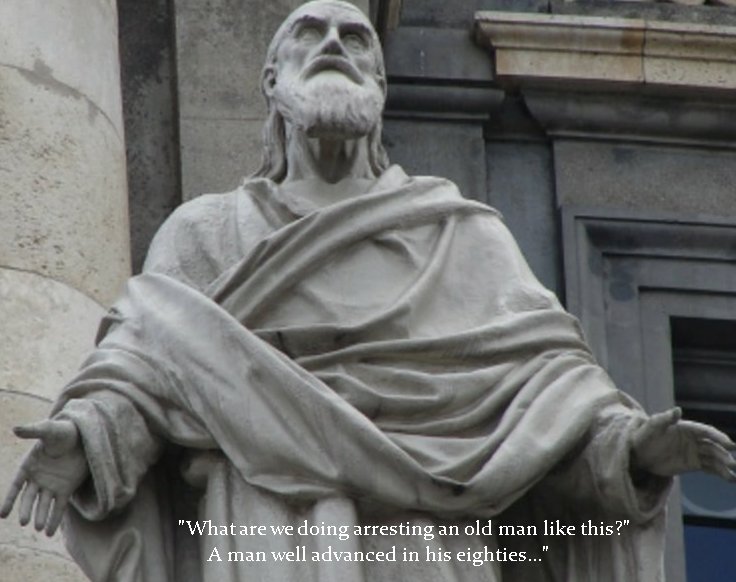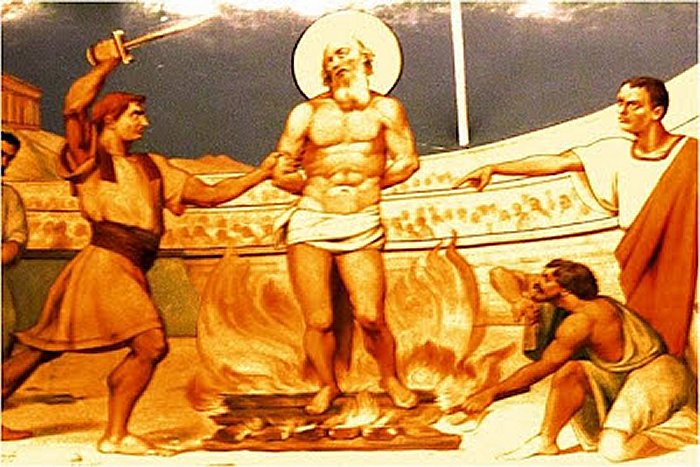Polycarp Of Smyrna: Burned At The Stake And Pierced With A Dagger
A. Sutherland - AncientPages.com - At the moment of his terrible death, Polycarp of Smyrna – one of the Apostolic Fathers and the most exceptional leader of the 2nd century Church - was at least a 86-year-old man.
"He who grants me to endure the fire will enable me also to remain on the pyre unmoved, without the security you desire from nails."
He is considered the last surviving person to have known an apostle, having been a disciple of St. John the Apostle.
Polycarp: Pupil Of The Son Of Thunder
Who was the man that stirred up so much hatred among the non-Christians of Smyrna?
His place of birth is not precisely known, but most probably, he came into the world in 69 AD in Asia, since we know he was sent to Smyrna (today the city of Izmir in Turkey) for studies. Smyrna - which competed with Ephesus and Pergamum for the title "First City of Asia" - has a long history. It was one of the principal cities of Roman Asia. A Christian church was one of the seven churches addressed in the Book of Revelation.
As a boy, Polycarp was taken into the care of St. John Apostle, for whom Polycarp became a beloved disciple. He was raised and formed in faith by one of the Sons of Thunder, who according to Mark 3:17 were James son of Zebedee and his brother John (to them he gave the name Boanerges, which means "sons of thunder"), and it was John who appointed him bishop of the Church in Smyrna.
Polycarp was highly respected as a teacher and church leader. Numerous historical testimonies confirm that he performed exemplary duties of his office.
Time of Persecution
Christian missionaries and converts to Christianity have both been targets of persecution, sometimes to the point of being martyred for their faith, ever since the emergence of Christianity.
In AD 95, Domitian, Emperor of Rome AD 81-96, started a persecution of the Church, and the Apostle John (also called John the Apostle, John the Revelator, John the Divine) was condemned by Domitian to be cast into a cauldron of boiling oil, still, the oil did not harm him, so Domitian banished him to labor in the mines on the isle of Patmos, where he wrote the famous ‘Book of Revelation’.
When the persecution against Christians had increased across the Roman Empire, Polycarp became the next offer, though, for many years, he was spared. He was forced to hide but was finally found. He made no effort to flee again; instead, he greeted the soldiers calmly and explained that he knew what they were coming for and that he was ready to die.
Tradition has it, he even invited them to dinner, and only asked for an hour of prayer. There was so much passion in his prayer that the soldiers regretted they were the ones who had to arrest him.
Moments Before Polycarp’s Death
Then, Polycarp was put on trial in Smyrna and confessed that he had served Jesus Christ for many years and had no intention of abandoning his faith.
The judge offered him what was the custom of the imperial authorities of the time: deny Christ, blaspheme him, and light incense in honor of our gods, and you shall live. Polycarp didn't want to live, at least not according to the Pagan rules. He wanted to achieve the eternal life that awaited him far from suffering on earth.
He rejected the proposal that was given to him and instead the brave old man said:
"For 86 years I have served him, and he has done me no wrong; how then can I blaspheme my King who saved me?"
"Eighty-six years I have served Christ and He has done me no wrong. How then can I blaspheme my King who has saved me?"
The judge threatened Polycarp that he would be burned alive, to which the arrested willingly agreed because he was not afraid of the fire and the death. Soldiers then tried to nail him to a stake, but Polycarp stopped them, saying:
"Leave me as I am. For he who grants me to endure the fire will enable me also to remain on the pyre unmoved, without the security you desire from nails..."
The pile was set on fire, and flames surrounded Polycarp’s body without touching or harming the body. Furious pagans saw that that the fire failed to consume his body, so they commanded an executioner to pierce the body of Polycarp with a dagger, and so was finally done.
Legend says that blood poured from his chest so profusely that it put out the fire.
He was martyred in about 168 AD and the Church commemorates St. Polycarp of Smyrna on February 23.
The date of Polycarp's death is in dispute. According to A historian of Christianity, Eusebius of Caesarea proposed that Polycarp's’ death took place c. 166–167 AD, but another theory is that Saint Polycarp died at the time of persecution of Christians Emperor Marcus Aurelius (121 - 180).
The files of his martyrdom state that it happened on February 22, 156, although he also gives the year 156. The earlier date better fits the tradition of his associations, especially with John the Evangelist, who was by Christians traditionally identified with John the Apostle (or John of Patmos).
Written by – A. Sutherland - AncientPages.com Senior Staff Writer
Copyright © AncientPages.com All rights reserved. This material may not be published, broadcast, rewritten or redistributed in whole or part without the express written permission of AncientPages.com
Expand for referencesReferences:
Long, Stephen. Polycarp Disciple of the Apostle John and the Second Century Church
More From Ancient Pages
-
 Masroor Temples – India’s Marvelous Ancient Cave Temples
Featured Stories | Jan 23, 2016
Masroor Temples – India’s Marvelous Ancient Cave Temples
Featured Stories | Jan 23, 2016 -
 What Was Life Like For Children In Ancient Athens?
Ancient History Facts | Jul 4, 2018
What Was Life Like For Children In Ancient Athens?
Ancient History Facts | Jul 4, 2018 -
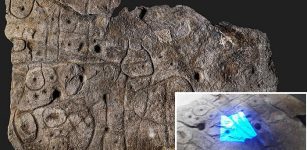 Large Bronze Age Stone May Be Europe’s Oldest 3D Map
Archaeology | Apr 8, 2021
Large Bronze Age Stone May Be Europe’s Oldest 3D Map
Archaeology | Apr 8, 2021 -
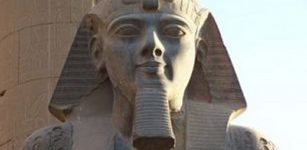 On This Day In History: Ramesses II Became Pharaoh Of Ancient Egypt – On May 31, 1279 BC
News | May 31, 2016
On This Day In History: Ramesses II Became Pharaoh Of Ancient Egypt – On May 31, 1279 BC
News | May 31, 2016 -
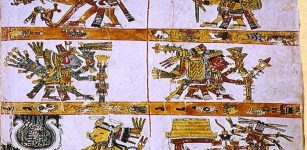 Codex Borgia: Pre-Columbian Mexican Manuscript Of Great Importance
Ancient Traditions And Customs | Sep 7, 2016
Codex Borgia: Pre-Columbian Mexican Manuscript Of Great Importance
Ancient Traditions And Customs | Sep 7, 2016 -
 World’s Oldest Shoe Is 5,000-Year-Old
Archaeology | Jul 10, 2015
World’s Oldest Shoe Is 5,000-Year-Old
Archaeology | Jul 10, 2015 -
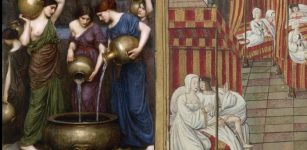 Mythical Danaides: Daughters Of Danaus Condemned In Hades To Eternal Punishment
Featured Stories | Mar 22, 2016
Mythical Danaides: Daughters Of Danaus Condemned In Hades To Eternal Punishment
Featured Stories | Mar 22, 2016 -
 Spartacus: The Rise And Fall Of An Unlikely Hero
Featured Stories | Oct 4, 2022
Spartacus: The Rise And Fall Of An Unlikely Hero
Featured Stories | Oct 4, 2022 -
 Medici Family – Powerful Renaissance Godfathers And Patrons Of Galileo Galilei
Featured Stories | Dec 17, 2018
Medici Family – Powerful Renaissance Godfathers And Patrons Of Galileo Galilei
Featured Stories | Dec 17, 2018 -
 ‘Reforms of Shang Yang’ – Location Of Ancient Yueyang – Confirmed
Archaeology | Jan 25, 2016
‘Reforms of Shang Yang’ – Location Of Ancient Yueyang – Confirmed
Archaeology | Jan 25, 2016 -
 Proof That Neanderthals Ate Crabs 90,000 Years Ago Is Another ‘Nail In The Coffin’ For Primitive Cave Dweller Stereotypes
Archaeology | Feb 7, 2023
Proof That Neanderthals Ate Crabs 90,000 Years Ago Is Another ‘Nail In The Coffin’ For Primitive Cave Dweller Stereotypes
Archaeology | Feb 7, 2023 -
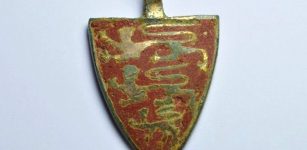 Priceless 800-Year-Old Treasure Featuring Three Golden Lions Unearthed
Archaeology | Aug 5, 2022
Priceless 800-Year-Old Treasure Featuring Three Golden Lions Unearthed
Archaeology | Aug 5, 2022 -
 Beer Was Used As Medicine And Payment In Ancient Egypt
Ancient History Facts | Feb 11, 2018
Beer Was Used As Medicine And Payment In Ancient Egypt
Ancient History Facts | Feb 11, 2018 -
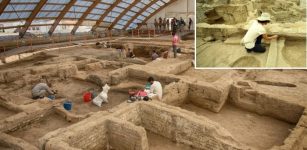 Unique And Unusually Large 8000-Year-Old Building Discovered At Çatalhöyük Site, Turkey
Archaeology | Sep 26, 2022
Unique And Unusually Large 8000-Year-Old Building Discovered At Çatalhöyük Site, Turkey
Archaeology | Sep 26, 2022 -
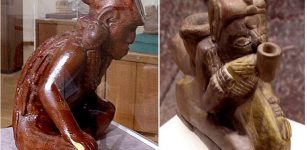 Unsolved Prehistoric Enigma Of Sophisticated Spiro People And Their Mysterious Mounds
Civilizations | Oct 25, 2018
Unsolved Prehistoric Enigma Of Sophisticated Spiro People And Their Mysterious Mounds
Civilizations | Oct 25, 2018 -
 Walls Of Lugo: Finest Example Of Late Roman Fortifications – Stands The Test Of Time
Featured Stories | Sep 22, 2022
Walls Of Lugo: Finest Example Of Late Roman Fortifications – Stands The Test Of Time
Featured Stories | Sep 22, 2022 -
 Unearthing Vadnagar And The Search For Hueng Tsang’s 10 Monasteries
Archaeology | Dec 11, 2015
Unearthing Vadnagar And The Search For Hueng Tsang’s 10 Monasteries
Archaeology | Dec 11, 2015 -
 On This Day In History: Soviet Spacecraft Venera 7 Launched: First To Send Data From Venus To Earth – On Aug 17, 1970
News | Aug 17, 2016
On This Day In History: Soviet Spacecraft Venera 7 Launched: First To Send Data From Venus To Earth – On Aug 17, 1970
News | Aug 17, 2016 -
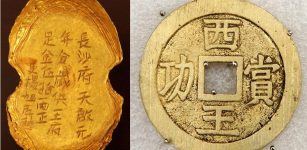 Ancient Legend Is Now Proven True: Sunken Treasure Of Gold And Silver Found
Archaeology | Mar 22, 2017
Ancient Legend Is Now Proven True: Sunken Treasure Of Gold And Silver Found
Archaeology | Mar 22, 2017 -
 Mystery Of The Candelabrum: One Of The Most Enigmatic Ancient Giant Ground Drawings In The World
Featured Stories | Nov 2, 2015
Mystery Of The Candelabrum: One Of The Most Enigmatic Ancient Giant Ground Drawings In The World
Featured Stories | Nov 2, 2015


